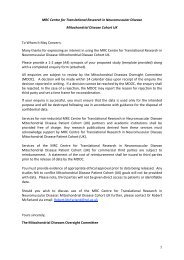user manual - The Rare Mitochondrial Disease Service for Adults ...
user manual - The Rare Mitochondrial Disease Service for Adults ...
user manual - The Rare Mitochondrial Disease Service for Adults ...
You also want an ePaper? Increase the reach of your titles
YUMPU automatically turns print PDFs into web optimized ePapers that Google loves.
NEWCASTLE MITOCHONDRIAL NCG DIAGNOSTIC LABORATORY<br />
<strong>Rare</strong> <strong>Mitochondrial</strong> Disorders <strong>Service</strong> <strong>for</strong> <strong>Adults</strong> and Children<br />
Background In<strong>for</strong>mation to the <strong>Service</strong><br />
Mitochondria are ubiquitous organelles that contain their own genetic complement, the<br />
mitochondrial genome (mtDNA). Although intimately involved in many cellular processes, their<br />
principal task is to provide the energy necessary <strong>for</strong> normal cell functioning and maintenance.<br />
Disruption of this energy supply can have devastating effects <strong>for</strong> the cell, organ and individual. One<br />
important consequence of mitochondrial ubiquity is that mitochondrial disease can affect virtually<br />
any organ and present with a plethora of symptoms and signs to a variety of specialties. <strong>The</strong>se are<br />
truly multi-system diseases with significant morbidity and mortality. Over the last two decades,<br />
mutations in both mtDNA and nuclear DNA (nDNA) have been identified as causative in a number<br />
of the mitochondrial clinical syndromes, although <strong>for</strong> mtDNA mutations in particular, this<br />
relationship between genotype and phenotype is often far from straight<strong>for</strong>ward. A number of<br />
epidemiological studies have been undertaken to assess the prevalence of mitochondrial disease and<br />
whilst rare these conditions have a major impact on both the community and individual families.<br />
Finally, there is increasing awareness by clinicians experienced in the management of patients with<br />
mitochondrial disease that many aspects of mitochondrial disease can be helped or prevented by<br />
early diagnosis and subsequent care.<br />
<strong>The</strong> Newcastle <strong>Mitochondrial</strong> Diagnostic Laboratory is an affiliated laboratory of the Northern<br />
Regional Genetics <strong>Service</strong>, and is situated within the research laboratory space of the University’s<br />
<strong>Mitochondrial</strong> Research Group in the Medical School. In partnership with teams at Queen Square,<br />
Institute of Neurology (UCLH NHS Foundation Trust) and the Ox<strong>for</strong>d Medical Genetics<br />
Laboratories, Churchill Hospital (Ox<strong>for</strong>d Radcliffe Hospitals NHS Trust), the Newcastle lab has<br />
been awarded National Specialist Commissioning (NCG) funding to provide a comprehensive,<br />
diagnostic and clinical management service <strong>for</strong> patients with mitochondrial disease in England and<br />
Scotland – “<strong>Rare</strong> <strong>Mitochondrial</strong> Disorders <strong>Service</strong> <strong>for</strong> <strong>Adults</strong> and Children”. This multidisciplinary<br />
service will encompass all aspects of diagnosis (muscle biopsy, histochemistry,<br />
biochemistry and molecular genetics), utilising specialist clinical and laboratory skills available at<br />
the three component centres, and complementing the routine analysis of common mtDNA<br />
mutations that is available throughout the UK at many regional genetics laboratories. For many<br />
patients with suspected mitochondrial disease, it is not possible to make a diagnosis based solely on<br />
molecular genetic testing in blood DNA, and so <strong>for</strong> those patients where more detailed<br />
investigations are required, a comprehensive diagnostic service is now offered which combines<br />
clinical investigations, histochemical and histological analysis of patient muscle biopsies,<br />
measurement of respiratory chain complex activities together with screening of both mtDNA and<br />
nuclear-encoded mitochondrial genes.<br />
<strong>Service</strong>s offered by the Newcastle <strong>Mitochondrial</strong> NCG Laboratory<br />
CLINICAL SERVICES<br />
Outpatient<br />
Consultations are available <strong>for</strong> patients and families with suspected or proven mitochondrial<br />
disease. Clinical examination may confirm the suspicion of mitochondrial disease or suggest an<br />
alternative diagnosis. Clear plans of investigation or patient management will be established during<br />
the clinic appointment with close collaboration between the referring consultant and the patients<br />
own general practitioner. Whenever possible, follow up will be at local hospitals, although some<br />
patients with particularly rare conditions or where local services are limited may require longer term<br />
follow up in Newcastle.<br />
Consultations are also available <strong>for</strong> women with proven mtDNA disease or who are carriers of<br />
pathogenic mtDNA mutations and who require advice concerning the possible transmission of the<br />
mtDNA mutation to their children. Patients or families in which mitochondrial respiratory chain<br />
Page 2 of 10 Date of original issue: March 2007<br />
Revised version June 2011




